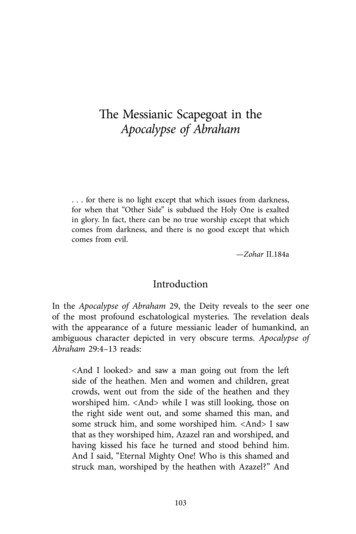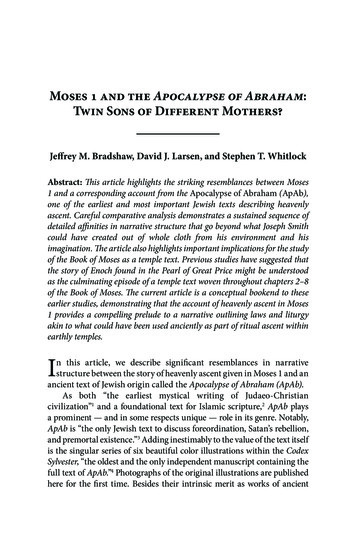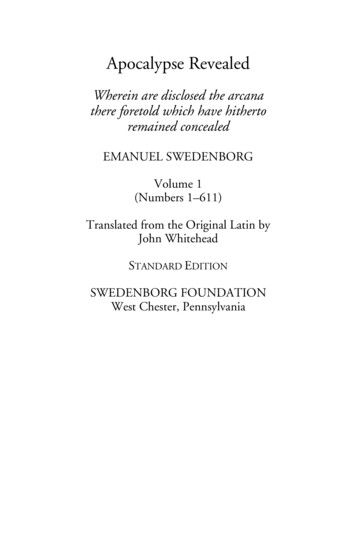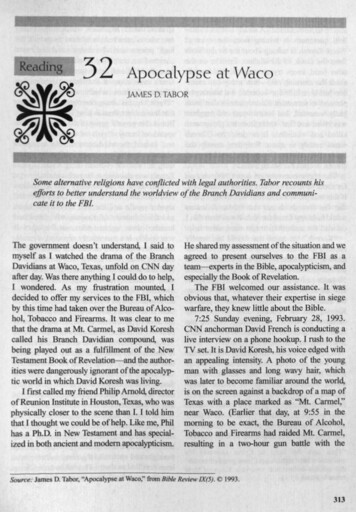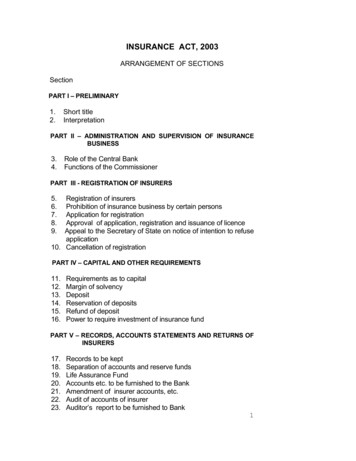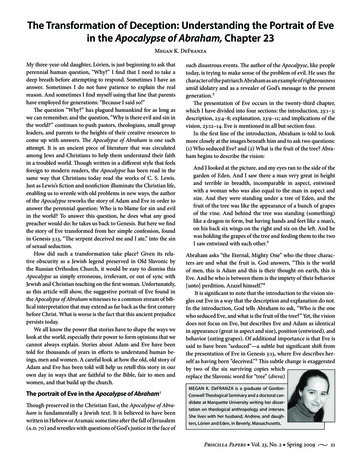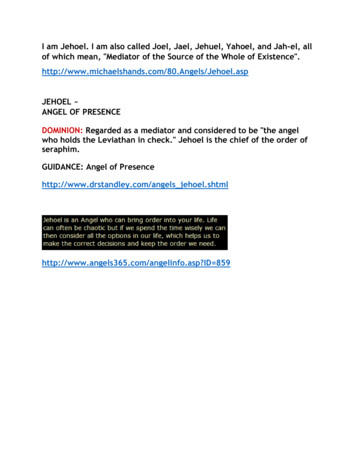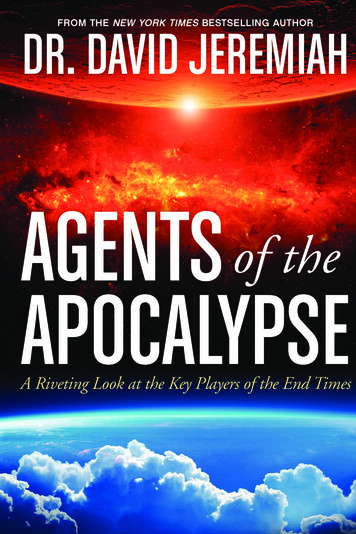
Transcription
AGENTS of theAPOCALYPSEA Riveting Look at the Key Players of the End TimesDr. DAviD JErEmiAhTyndale House Publishers, Inc.Carol Stream, Illinois
Visit Tyndale online at www.tyndale.com.TYNDALE and Tyndale’s quill logo are registered trademarks of Tyndale House Publishers, Inc.Agents of the Apocalypse: A Riveting Look at the Key Players of the End TimesCopyright 2014 by David Jeremiah. All rights reserved.Cover photograph of people copyright PeskyMonkey/iStockphoto. All rights reserved.Cover photograph of galaxy copyright Igor Zh/Shutterstock. All rights reserved.Author photograph taken by Alan Weissman copyright 2011. All rights reserved.Designed by Jennifer PhelpsPublished in association with Yates & Yates (www.yates2.com).All Scripture quotations, unless otherwise indicated, are taken from the New King James Version. Copyright 1982 by Thomas Nelson, Inc. Used by permission. All rights reserved.Scripture quotations marked KJV are taken from the Holy Bible, King James Version.Scripture quotations marked NIV are taken from the Holy Bible, New International Version, NIV. Copyright 1973, 1978, 1984, 2011 by Biblica, Inc. Used by permission. All rights reservedworldwide.Scripture quotations marked TLB are taken from The Living Bible, copyright 1971 by TyndaleHouse Foundation. Used by permission of Tyndale House Publishers, Inc., Carol Stream, Illinois60188. All rights reserved.Library of Congress Cataloging- in- Publication DataJeremiah, David, date.Agents of the Apocalypse : a riveting look at the key players of the end times / Dr. David Jeremiah.pages cmIncludes bibliographical references.ISBN 978-1-4143-8049-0 (hc)1. Bible. Revelation—Criticism, interpretation, etc. I. Title.BS2825.52.J46 2014228'.06—dc232014024615Printed in the United States of America207196185174163152141
ContentsIntroduction viiChapter 1The Exile 1Chapter 2The Martyrs 25Chapter 3The 144,000 53Chapter 4The Two Witnesses 79Chapter 5The Dragon 105Chapter 6The Beast from the Sea 129Chapter 7The Beast from the Earth 157Chapter 8The Victor 183Chapter 9The King 211Chapter 10The Judge 239Epilogue: The OvercomersAcknowledgments275Notes 277About the Author283265
IntroductionAgents of the Apocalypse came about because so many peopleurged me to write another book on Revelation. I can well understandthe current interest in the end times. We live in an increasingly chaotic and godless world, and many Christians believe the dark shadows of the Apocalypse are looming on the horizon. In the last centurywe saw brutal persecution of Jews and faithful Christians in nationssuch as Germany, Russia, and China. Today God’s people continueto face torture and death in countries throughout the Middle East,Africa, and Asia. Even in Western nations, which have long upheldChristian principles, the repression of Christian expression andpractice has begun. And if history is any guide, this discriminationagainst believers is bound to increase.I encounter Christians every day who are anxious about thefuture, not only because of this increase in a nti- Christian sentimentbut also because of the decline of economic and social stability. Intimes like these, people tend to look even more closely at the book ofRevelation, because perhaps above all others, it encourages Christiansto keep hope alive. It recognizes the hard facts of worldwide disintegration and persecution, yet it assures God’s people of certain victory.Because of the critical importance of Revelation and its relevancev ii
agents of the apocalypsefor our current reality, I recognize the need for fresh books to helpkeep its message alive. But that need also presents a big challenge.Revelation is hardly a fresh subject for authors to write about. Nodoubt thousands of books have been written on the topic, and I havealready contributed several to that number myself. So when I wasurged to write again on the subject, the burning question in my mindwas, How can I write a book that will present this important message ina new and captivating way?The answer that found its way into my mind was to use dramatized accounts to make the prophecies in Scripture come to life. Butat first I could hardly accept the idea. I wanted to present the biblicaltruths of Revelation, not speculative fantasy that might lead readersto wonder about its accuracy. Yet the value of story as a vehicle fortruth had been impressed on me by a man who is widely recognizedas the most influential writer on Christianity in our time: C. S. Lewis.Lewis was a young atheist when he first read Phantastes, anovel by the nineteenth- century Scottish Christian author GeorgeMacdonald. Lewis reported that a new quality, a “bright shadow,”leaped off its pages and that his “imagination was, in a certain sense,baptized.”1 Though the book did not prompt Lewis to convert onthe spot, it was the starting point in his journey to faith. Years later,Lewis’s close friend J. R. R. Tolkien, the author of The Lord of theRings, described the ancient myths of gods who died and were rebornas stories that prefigured Jesus’ crucifixion and resurrection. Lewiseventually became convinced that the story of Christ as presented inthe Gospels “is simply a true myth.”2In response to those who were suspicious about the power of storyto present truth, Lewis said, “Reason is the natural organ of truth;but imagination is the organ of meaning.”3 He was saying that storiescan align reason with imagination and mind with emotion. Whentruth is put in imaginative form, it can be driven not only into themind but also into the heart.v iii
introduction So I asked myself, Could stories be used to drive the messageof Revelation into the human heart? The more I thought about it,the more convinced I became that they could. While the book ofRevelation presents an overview of the future, it provides little detail.That is not its purpose. Yet the cataclysmic and triumphant events itportrays will affect real people in real situations. The players identifiedby Revelation in this end- times drama will also be real people— eitherpeople who go bad and wreak destruction, such as the Antichrist andthe false prophet, or faithful people such as the martyrs and the twowitnesses, who stand against these demonic individuals.Capturing these players through the lens of story allows Revelationto come to life in a new way. It enables us not only to see the overarching truths of Scripture but also to experience them vicariously.It gives us the chance to see the actions of these individuals up closeand personal as they play out this cosmic drama.In this book I’ve devoted one chapter to each of the most prominent players in Revelation— those who are the primary agents of theApocalypse. After I did the research on the key players or groups ofplayers, I asked my friend Tom Williams if he would write the drama tizations that illustrated the biblical truths. He agreed to do so, andwe have ended up with this unique book.I want to emphasize that in the writing of these fictional accounts,nothing presented in the Bible has been altered. The dramatized elements are constructed firmly on the facts of Revelation. The storiesmerely fill in the gaps that Revelation does not address. They presentpossibilities about how the biblical events could play out. I recognizefully that these scenes cannot fill in the gaps with perfect accuracy,but they offer one possibility among many with one goal in mind: todrive the truths of the end times not only into the mind but also intothe heart. My hope is that these stories will serve as a reminder thatthe book of Revelation isn’t just theoretical; it’s intended to depict real- life individuals and situations.ix
agents of the apocalypseEach chapter in this book is divided into two sections. The firstis the dramatized account, which is followed by a section called“The Scripture behind the Story.” My hope is that the dramatization will whet your appetite to explore the biblical truths behind thestory. This second section digs deeper into Scripture, with discussions about what Revelation says and how it can be interpreted andapplied. This setup enables you to separate the facts from the fictionand understand the biblical foundation that undergirds the story.Thus you get everything from this book that C. S. Lewis would want.The story drives the truth into your heart, and the Scripture behindthe story drives it into your mind.It is my heartfelt prayer that this book will impress the truthof Revelation into both your mind and your heart, and that it willstrengthen your resolve to stand firm for Christ in the face of theworst of circumstances. I also pray that this book will help you torealize the overarching truth of Revelation: that the Christian’s victory in Christ is an absolute certainty.Dr. David JeremiahFall 2014x
chapter oneThe ExileIt was a Sunday morning i n the first century AD, and the membersof the Ephesian church were gathering to worship in the spaciousatrium in the villa of Marcellus, a wealthy Roman convert who freelyoffered his home as a meeting place.As the members arrived, their faces were taut with uncertainty.Tension filled the air, like a mooring line ready to snap. The meetingbegan as usual, with a hymn, but today the church sang with littlefeeling. Their minds were distracted by the ominous rumors comingout of Rome. After a prayer and a reading from the prophet Isaiah,Tychicus, one of the deacons, stood to address the congregation.“Dear brothers and sisters, the church leaders have asked me toinform you of evil tidings. A decree has just been posted in the forumtelling us that the Roman emperor Domitian has assumed the title‘master and god.’ He has demanded that everyone in the empireswear an oath to worship him. He has already launched an aggressive1
agents of the apocalypsecampaign to enforce the edict in every city under Rome’s jurisdiction. What is worse, he has especially singled out Jews and Christiansbecause he suspects our disloyalty to Rome.”A voice from the crowd called out, “Are the rumors true that theedict has already been enforced in some of the other churches?”The deacon nodded soberly. “A fortnight ago Roman soldiersinvaded all the Christian homes they could find in Pergamos anddemanded that every member immediately take the oath of worshipto Domitian.”“Did they do it?” another tremulous voice asked.A pained look crossed Tychicus’s face. “It grieves me to report that two- thirds of them gave in and took the oath.”A gasp rippled through the crowd. “What happened to those whowould not bow?” someone asked.“I am sorry to tell you that they were brutally flogged and executed. And we can be sure the same thing will soon happen here inEphesus.”The room fell silent. Finally someone asked, “What can we do?”At that moment, an aged man who had been sitting to the sidestood slowly, aided by the staff in his hand. Unlike the other facesin the room, his showed no distress. In fact, he positively radiatedjoy. “It was almost as if his face glowed,” one member later observed.The apostle John faced the group. “My dear brothers and sisters,”he began, “you ask what we can do. There is but one answer.” At theage of ninety, his voice still rang out clear and strong. But there wasa warmth in his delivery that dissolved much of the tension in theroom.“We can stand ready to give back to our Lord Jesus Christ whatHe has given to us. He gave us life by giving up His life, and we mustdo no less for Him.”“Perhaps we should stop meeting for a while,” Marcellus said.“That would keep us from being so visible and identifiable.”2
The Exile“No, that is exactly what we must not do,” John replied. “Wemust look at this trouble coming our way as a test of our faith. Willwe love our Lord enough to stand firm and suffer with Him? Or willwe turn our backs on the One who gave us the greatest gift of love inhistory? With such trouble coming, we need more than ever to meettogether in order to support and encourage one another to standstrong. If we stop assembling, we will isolate ourselves and lose thestrength we draw from each other. We must never stop meeting, nomatter how severe the persecution.”“As long as this threat remains, we have decided that we shouldmeet all over the city in separate homes,” Tychicus said. “The Romanswill never be able to find us all. Some of us may fall, but the churchin Ephesus will survive.”“And, I hope, grow even stronger in the face of the persecution,”John added. “Sometimes I fear that we are becoming complacentand that the love we originally had for our Lord and for each otheris beginning to cool. Persecution could rekindle that love by drawingus together as we face a common danger.”“Why is God letting this happen?” a voice cried out from theback. “We have been loyal and dedicated. We have done many goodthings in Christ’s name. Yet the more good we try to do, the morethe world seems to hate us.”“Do not marvel, my brothers and sisters, if the world hates you,”John replied. “Our Lord and Savior was perfect in every way, andyet the world hated Him. People hate what they do not understand.We should look on this coming trial as a great honor. We are beingchosen to share His cross and His sacrifice for us. Many who havealready died for Christ have received their suffering with joy. In theyears since His death and resurrection, all my fellow apostles, including that late- coming firebrand Paul, have been called to suffer deathfor Him. I am the only apostle remaining who has been denied thathonor. And now that I see it on the horizon, I welcome it with all3
agents of the apocalypsemy heart. I urge all of you, my dear brothers and sisters, to remainsteadfast and true to Christ, no matter the cost. You will receive areward in heaven that will make your sacrifice seem as a mere trifle.”John resumed his seat, leaning heavily on his staff. After anotherhymn and several prayers, the assembly dismissed.As usual, the members clustered around John with questions orprayer needs, or simply to bask in the man’s magnetic presence. Buttoday a tense undercurrent ran through the conversations. It wasn’tlong before Marcellus pushed his way through the group and stoodfacing the apostle. His face was as red as wine, and his eyes blazedwith anger.“How can you ask us to do this?” he demanded. “I have a wife andfive young children. Do you expect me to just stand by while they aretortured and slaughtered? I will not do it! The rest of you can meetnext Sunday like cattle waiting for these Roman butchers. But not I!You must find another place to meet. There will be no worship hereuntil this crisis has passed. I am perfectly willing to live for Christ,but it’s too much to ask me to die for Him!”Without another word, Marcellus turned on his heel and walkedaway. Soon the remaining members dispersed to their homes. Howwould they react when the Romans came? They weren’t entirely sure.Would they face the crisis with the courage of their apostle John orwith the fear of Marcellus?* * *The following Sunday, a small group of families assembled in John’shome to worship. Five of the expected t wenty- three members werenot in attendance. Nothing was said about those who were missing,but the morning prayer included a petition that all would regain theircourage and stand fast. After a few hymns, a Scripture reading, andmore prayers, John stood to speak.Suddenly the door burst open, and eight Roman soldiers barged4
The Exilein. They were dressed in armor and carried swords. The startledChristians stared wide eyed, and mothers drew their children closeto them.The commanding officer opened a small scroll and read theemperor’s demand. “You must cease to worship your God,” he proclaimed. “It is lawful to worship only Domitian.”After the reading, one of the soldiers held up a bronze statue. Itwas over a foot tall and bore the precise image of the emperor’s face.The commander rolled up the scroll and said, “The emperorDomitian requires that you show your compliance with his orderthis day by bowing down before his image. If you refuse, you will beput to death.”Not one of the Christians moved. This was a fragile moment, andthey all knew it. If any of them broke and bowed to the image, othersmight lose courage too and do the same. After a tense moment ofsilence, the commander nodded to his men. They drew their swords.A woman near the front shrieked and fell to the floor. She kneltbefore the image and swore the oath. Her husband quickly followed,as did four other members. But the rest of the assembly held firm,some of them mouthing silent prayers.“The six of you who yielded have saved your lives, for whatever they are worth.” The commander made no effort to hide hiscontempt.As the six scrambled out the door, the officer strode toward John.“I believe you must be the one your people call John the Apostle.”“I am he,” John replied.The commander turned to his soldiers. “We have finally foundhim, men— the ringleader of all the churches in Asia Minor. This isthe chief rebel who has led thousands of citizens to deny the authority of Rome and worship a man who was executed as a criminal.”The commander turned back to John. “Word of your disloyaltyhas reached the ears of the emperor himself, and he has a special5
agents of the apocalypsepunishment reserved for you. Instead of slaying you outright, hewants to make you suffer until you wish you were dead. Your fatewill show your followers the futility of resisting Rome.”The commander seized John and shoved him out the door. Theother soldiers followed and bolted the door from the outside, trappingthe Christians who remained within. One soldier produced a torch,lit it with his flint, and set fire to the house. As the soldiers led Johntoward the Roman garrison, John could see the house begin to blaze.They were fifty paces away when the commander stopped andturned toward the now- flaming cottage. “What is that noise?”“It is singing,” John replied. “My faithful brothers and sisters aresinging a song of praise to their true Lord, Jesus the Christ, whomthey will meet face- to- face within this very hour.”John leaned heavily on his staff, struggling for breath, but theyforced him to march on. Upon arrival at the garrison, he was handedoff to a prison guard, who clamped chains on John’s ankles anddragged him out to the yard. The soldiers stripped him to the waist,chained his wrists to a post, and flogged him with a m etal- studdedwhip. Then they locked the apostle inside a damp, reeking cell. Forseveral days he lay there suspended between life and death.Yet in spite of his shredded back, the filthy conditions, and themeager food portions, John never cursed his guard. The soldier,impressed by John’s perseverance, began to slip additional food tohim. Over the next few weeks, John’s wounds healed, and eventuallyhe was able to stand and limp about his cell. One day the guard calledfor him to come close.“I have learned what is to become of you,” he whispered. “Youare to be taken to the Isle of Patmos, where you will be exiled for therest of your life.”“Patmos!” John repeated. He knew of the island— an infamousdumping ground for Rome’s convicted prisoners. “When will I besent to exile?”6
The Exile“In two days. You will not be fed well on the v oyage— and not atall on the island. I will bring you a small sack with bread and grapesthat you can slip under your robe and smuggle aboard the ship.”“Thank you, but if it’s all the same to you, I would much prefera roll of parchment and a vial of ink.”“I will do what I can.”* * *Two days later John boarded a ship leaving the Port of Ephesus forthe three- day voyage to Patmos. Beneath his robe he carried a flatleather bag containing his parchment and ink.The ship— a converted Roman merchant vessel— was propelledby a single square sail and forty oars below deck. The departing exileswere forced to man the oars— with the exception of John, who wasstill wearing ankle chains, and three others, who were exemptedbecause of age or disability. They were kept on deck near the prowof the ship.As the ship sailed into the port on Patmos, John looked out ona landscape of barren hills, arid fields of sand and salt, and rockycrags dotted with brambles and stunted trees. As the prisoners disembarked, each was given a three- day ration of dried meat and fish.“That’s all you get,” the quartermaster told them. “When it’s gone,you’re on your own.”John soon learned that the exiles were on their own in other waysas well. They would not only have to gather their own food but alsowould have to find shelter. While there were two or three crudesettlements that had been built on the ruins of ancient towns, thesestruggling villages provided no protection from the island’s population of exiled criminals. The only law was self- preservation andsurvival.Incoming exiles either found their own shelters among the island’scaves or built huts from rocks and deadwood. When John was aboard7
agents of the apocalypsethe ship, he had heard rumors that the far side of Patmos was theleast populated. He reasoned that food and shelter would be morereadily available there, so he headed out on a trek across the island.The aged apostle was nearing exhaustion when he stumbled uponan abandoned cave. It overlooked the sea, and a trickling streamflowed nearby.Born and raised a fisherman, John gathered some tough vines andwove together a serviceable net. He hobbled down to the shore andclimbed onto a promontory that was strewn with boulders. When hereached a ledge overhanging the deeper water, he dropped the net,retaining his hold on its long leaders, and waited. Two hours later hereturned to the cave, his makeshift net filled with three large crabsand two silver fish.* * *As the days wore on, each like the one before it, John began to feelthat his life had become m eaningless— that he was doomed to liveout his remaining time on earth without purpose. He often wondered why he hadn’t been martyred like his fellow apostles.One bright Sunday, after his morning worship and midday mealof fish and berries, John hobbled off toward his favorite spot overlooking the sea. He sat down on his usual rock, shaded by a toweringboulder, and gazed out on the g ray- green water. Placing his parchment on his lap, he took out a quill to write a letter.That’s when it happened.A great voice boomed from just behind him. “I am the Alpha andthe Omega, the First and the Last.” The mighty words reverberatedthrough the heavens like rolling thunder.John dropped his quill and began to tremble. Nearly paralyzedwith terror, he could hardly bring himself to look toward the sourceof the voice. But there was something so compelling about that voicethat he finally had no choice but to turn around.8
The ExileBefore him stood the most magnificent and majestic Man he’dever seen. His face shone with the brilliance of the sun. He wasclothed in a shimmering robe of pure white that was bound aboutHis chest with a golden band. His hair was w hite— not the lank,faded white of advanced age, but the vibrant, glistening white ofpure snow.The Man’s eyes burned into John’s soul like piercing flames. InHis right hand He held seven brilliant stars. When He spoke, thewords rolled off His tongue like tidal waves. Everything about theMan exuded such perfect beauty and glory that John’s senses wereoverwhelmed. He fell to the ground in a dead faint.He was awakened by a gentle touch on his shoulder.“Do not be afraid,” the Man said, His voice so infused with loveand warmth that John’s fear dissolved like wax in the sunlight.“I am the First and the Last,” the Man said again. “I am He wholives and was dead, and behold, I am alive forevermore. And I havethe keys of Hades and of Death.”John realized that he was once more in the presence of the Lordhe adored. He basked in waves of unforeseen joy.The golden voice told John to take up his quill and record the im— wonders concerning thingswonders about to be revealed to hexisting and things yet to come. John, now filled with expectation,sat again with the quill in his hand and the scroll on his lap.The voice spoke: “What you see, write in a book. . . .”Immediately the Lord began to dictate warnings, rebukes, andcommendations to the seven churches that had looked to John astheir patriarch. As John completed the final letter, the vision ofChrist vanished, and His voice called from somewhere above: “Comeup here, and I will show you things that must take place after this.”In that moment, the familiar landscape of Patmos faded, and Johngazed awestruck at what no earthly human being had ever s een— the very throne room of heaven. Vision after vision f ollowed— some9
agents of the apocalypsehorrifying to behold and others majestic beyond imagination. As thelast vision faded, the apostle heard these final words: “I am comingquickly!”Suddenly John found himself sitting back on his rock in the shadeof the boulder. He had been given a vision of things to come— amessage that would assure the Lord’s churches across the world thatalthough terrible persecution loomed in their future, their ultimatetriumph in Christ was certain.“Yes, Lord, please come quickly,” he said as he rolled up the scroll.* * *The Scripture behind the StoryThe apostle John, in writing his great book from the Isle of Patmos,joined an exclusive band of chosen servants who had received similarinstructions from the Lord and had done their work under adversecircumstances. Moses wrote the Pentateuch in the wilderness. Davidwrote many of the psalms while fleeing from the murderous King Saul.Isaiah wrote while watching his nation degenerate, and according totradition, he died a martyr’s death. Ezekiel wrote while he was in captivity in Babylon. Jeremiah’s life was one of trial and persecution. Peterwrote his two letters just before he was martyred. Paul wrote his lettersamid being beaten, shipwrecked, stoned, and robbed, and while facing hunger, thirst, cold, nakedness, slander, and just about every otherkind of tribulation known to humankind (2 Corinthians 11:24-28).And John received the most extensive revelation of future eventsshown to any writer of the New Testament while he was banished to Patmos— a small, rocky island in the Aegean Sea. He was shut outfrom the world but shut in to God, and from that lonely island hegave us the book we know as the Revelation of Jesus Christ.10
The ExileGod very well may have allowed John’s banishment so he couldbe alone with Him and receive this monumental vision of the future.Sometimes the work He has for us requires removal from our normal environment. Abraham’s call, Joseph’s slavery, Moses’ flight fromEgypt, and Daniel’s captivity come to mind. Many writers I know getaway to a mountain retreat or even a hotel room so they can concentrate fully on their task. My schedule calls for frequent flying, and Itend to do my best writing, planning, and thinking in the isolationof an airplane at thirty thousand feet.As we open the book of Revelation, it quickly becomes apparent that we are about to encounter a message with a high purpose.Though it bears certain similarities to prophetic passages in Daniel,Ezekiel, and Matthew, Revelation is unique. It tells us what kind ofbook it is in the first few paragraphs.A Prophetic BookThe Revelation of Jesus Christ, which God gave Him to showHis servants— things which must shortly take place. And Hesent and signified it by His angel to His servant John.R e v e l at i o n 1 : 1This verse displays the prophetic nature of what John wrotethrough the use of one key word and one key phrase. The key wordis revelation, which is the translation of the Greek word apokalypsis,or “apocalypse.” In the Greek New Testament, this is the first wordof the entire book.When we hear the word apocalypse, we think of horrible disastersassociated with the end of the world. But in Greek, the word simplymeans “an uncovering; an unveiling; a manifestation of.” The primary purpose of the book of Revelation is not to paint a picture ofthe end times, although it does do that. It was written primarily to11
agents of the apocalypseunveil, or uncover, the majesty and power of Jesus Christ. The bookis neither a puzzle nor an enigma but a disclosure of who Jesus is.The key prophetic phrase used in verse 1 is translated “mustshortly take place.” This expression describes something that suddenly comes to pass. It indicates rapid progression after somethingcommences. The idea is not that the event may occur soon but thatwhen it does, it will occur suddenly. It’s like a California earthquake:we don’t know when the next will come, but we know that it will.And it will come suddenly and without warning.A Personal BookJohn . . . bore witness to the word of God, and to thetestimony of Jesus Christ, to all things that he saw.R e v e l at i o n 1 : 1 - 2The book of Revelation is cosmic and far reaching in its scope, yetit is also very personal. This is a message that John received personally from the Lord. John writes to those with whom he is intimatelyacquainted, referring to himself as a “brother and companion” intribulation (1:9).Christ said to John, “What you see, write in a book and send itto the seven churches which are in Asia: to Ephesus, to Smyrna, toPergamos, to Thyatira, to Sardis, to Philadelphia, and to Laodicea”(Revelation 1:11). The seven letters we find in chapters 2 and 3were personal letters written to actual congregations in Asia Minor( modern- day Turkey) at the end of the first century AD.According to theologian John Stott, “The seven cities mentioned form an irregular circle, and are listed in the order in whicha messenger might visit them if commissioned to deliver the letters.Sailing from the island of Patmos . . . he would arrive at Ephesus.He would then travel north to Smyrna and Pergamum, south- east12
The Exileto Thyatira, Sardis and Philadelphia, and finish his journey atLao
Jeremiah, David, date. Agents of the Apocalypse : a riveting look at the key players of the end times / Dr. David Jeremiah. pages cm Includes bibliographical references. ISBN 978-1-4143-8049- (hc) 1. Bible. Revelation—Criticism, interpretation, etc. I. Title. BS2825.52.J46 2014


